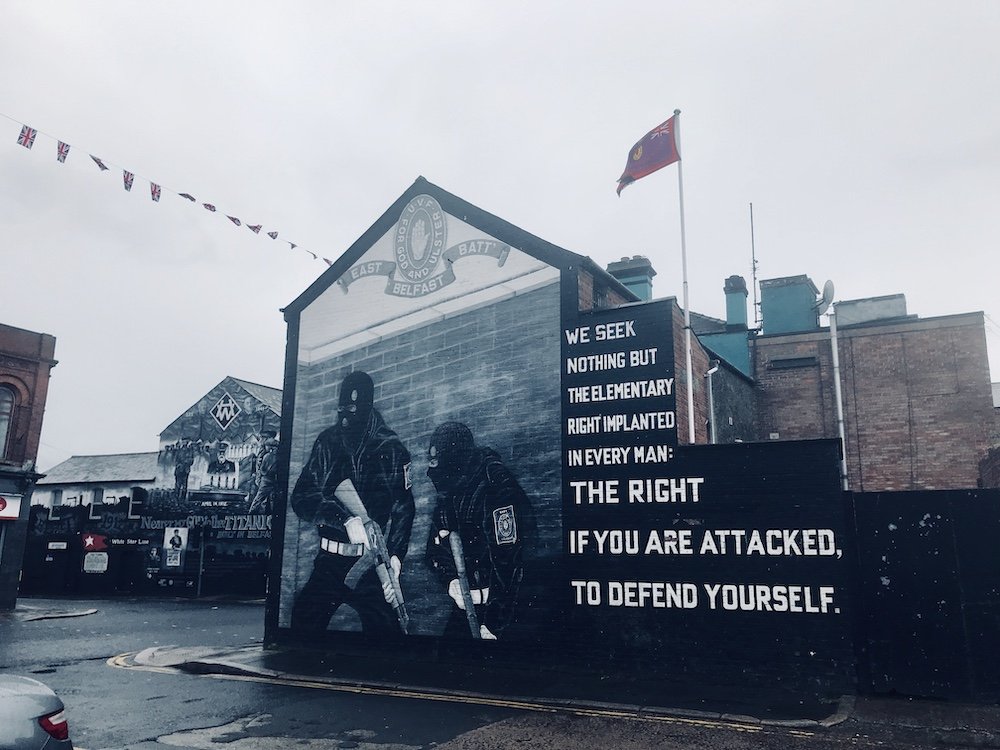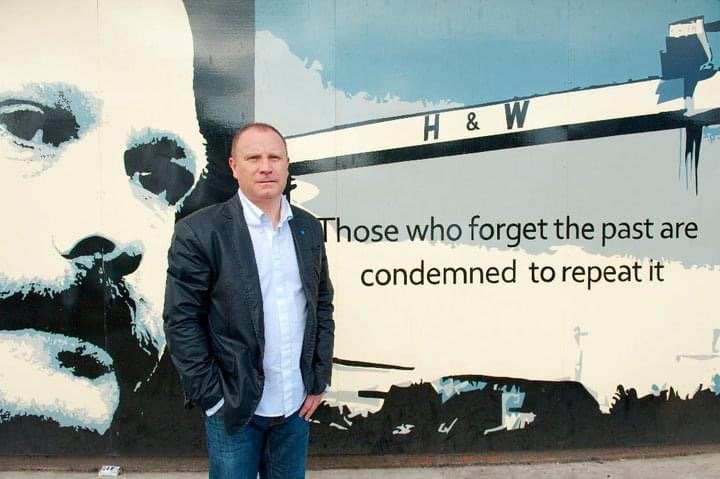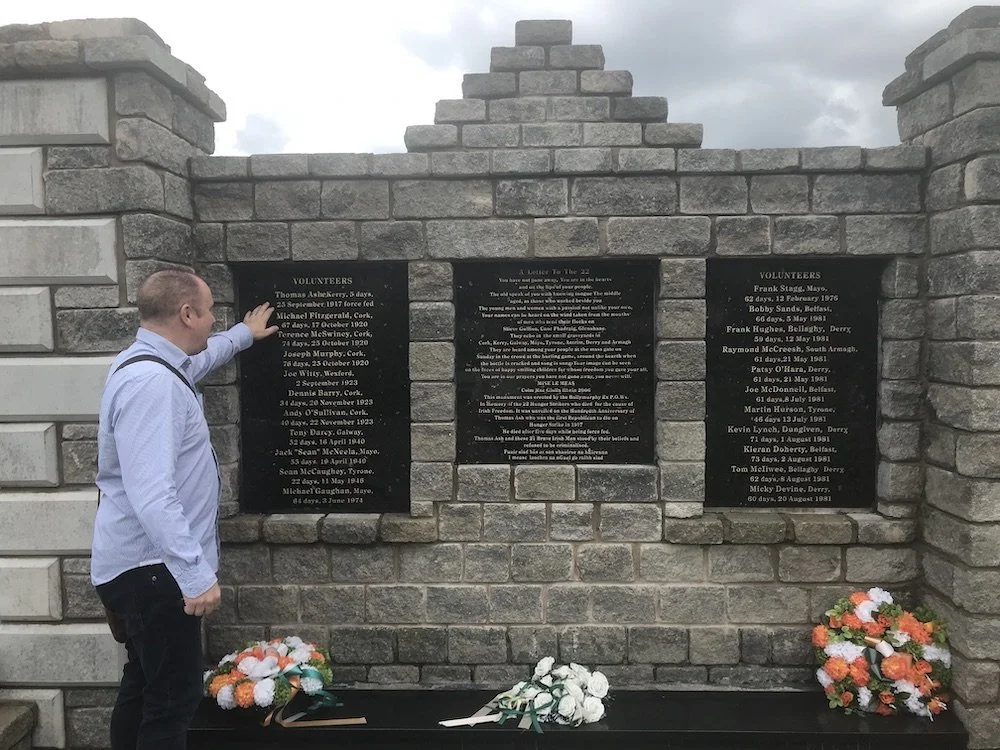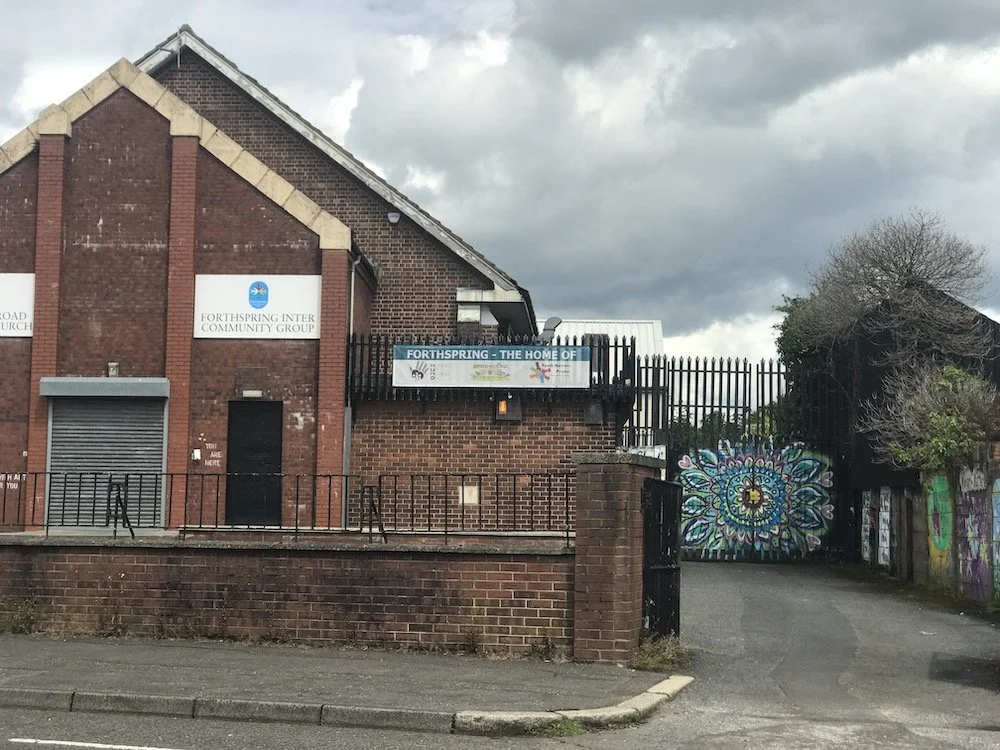Q&A With Rev. Gary Mason: Faith On The Peace Lines Of Northern Ireland
A loyalist mural commemorating the Troubles, Newtownards Road, Belfast, Country Antrim, Northern Ireland. Across the street is a mural depicting the Titanic, which was built in Belfast. Photo by Brie Loskota.
This interview is part of the USC Center for Religion and Civic Culture’s project on engaged spirituality, which seeks to understand what makes people doing extraordinary work who they are.
Listen to a conversation between Brie Loskota and Gary Mason from NewGround
Amid the bombings and murders of Northern Ireland’s decades-long conflict called the Troubles, the Rev. Gary Mason would go to the bars that he had frequented before embracing Christianity and talk with combatants.
“Tell me your story,” he would say. “What shaped you as a person? What voices spoke into your life to give you that worldview?"
“Because they weren't born with this,” the Methodist minister said of the hatred and fear of the other side in the 1968-1998 conflict that pitted Protestant loyalists, who wanted to remain in the United Kingdom, against Roman Catholic nationalists, who wanted to join the Republic of Ireland.
Today, Mason says this approach to building relationships is needed to bridge the divides around race and politics in the United States and the conflict between Israelis and Palestinians.
“I'm not asking you to agree with them, but if you try to understand why they made those choices, distasteful as they may be, it'll allow you a possible route map to help them to move out of that,” Mason said.
The Rev. Gary Mason stands in front of a 2008 work by Ross Wilson commemorating David Ervine (WP) in Montrose Street South, Belfast. Photo courtesy of Rev. Gary Mason.
Two Protestant loyalist paramilitary groups announced the decommissioning of their weapons in Mason’s church. In addition to working with combatants, Mason helped establish Skainos, the largest faith-based redevelopment project in Western Europe, as a model of coexistence.
He and a Catholic Dominican sister developed the Forthspring community project on the peace line in West Belfast as a place for two communities to come together around issues of common concern. From 1999 to 2014, Mason served as superintendent and CEO of the East Belfast Mission, one of the largest Methodist missions in Europe.
In 2015, he founded Rethinking Conflict to bring what he learned while working on the Irish peace process to others in Ireland and beyond. Mason has spoken to 60,000 people in the past five years, he said.
“The giving away has been to me the most blessed experience,” Mason said. “I have seen another generation say, ‘We can also make a difference.’”
In the following interview with Brie Loskota, a fellow with the USC Center for Religion and Civic Culture, Mason talks about growing up and ministering in the context of conflict. Loskota and Mason were honored with the 2021 Trailblazer Awards by Newground: A Muslim-Jewish Partnership for Change. Their conversation has been edited for clarity and length.
Brie: Can you tell me about your early life?
Gary: I often tell a story that can contextualize my life. It’s a story of three boys, growing up in the 1960s-70s. Two went to primary school together, and two went to religious Sunday school together. One of those boys is now dead — he was shot in the back during a terrorist feud in the early 1980s. The second boy served a life sentence — he slit someone ear to ear, tossed their body in a back alley. And I'm the third boy — I became a Methodist clergy person.
When I tell that story, particularly in the States and in religious contexts, people immediately want to spiritualize it: “Gary, prevenient grace, the grace that goes before, God's hand was on you.”
And then they come up sharp when I say, “I'm not so sure.”
I don't know why there's such a thing as a theology of luck because I saw many of my boyhood friends choose terrorism. Or were they freedom fighters? Or were they militia groups? And I didn't make that choice. It probably had something to do with teenage hormones. I had a date with a girl that night, simple as that.
As a colleague of mine said, someone did not fly over Northern Ireland in the 1960s and spray us all with lunatic gas. And then we woke up one day and said, “Let's start killing each other.” It is not justifying political violence, but invariably, it doesn't arise in a vacuum. There are contextual mechanisms that sadly make people who seem normal do very abnormal things.
I was born in a working-class family — super parents — but I was born in a British Protestant unionist loyalist culture. I lived in a neighborhood that was primarily Protestant but with some Catholic families. When the conflict wasn't happening, there was some integration. And it seemed normal in those years. You played together; you went to different schools — obviously went to different churches.
There was always sectarianism, not unlike the United States now, bubbling below the surface. You would hear comments from family members about the other. It was never pronounced, but it was there. You were aware they were different to a degree and concerned that some of them may want to overthrow the state of Northern Ireland, which was quite young. You were hearing those messages in your head as a young child, and that was shaping not necessarily profane suspicion but maybe, at times, caution.
Brie: What was it like during the Troubles?
Gary: In 1972, we had a terrorist incident every 40 minutes. As a kid, you were going to bed hearing bombings or gunfire in the distance — sometimes not in the distance. In the evening news, you heard two people who were shot dead in a Catholic neighborhood, and you knew by the next day that two people or three people from your side were going to be murdered. They were simply tit-for-tat killings. In my class, a boy, John — his dad was blown up in an explosion. It was never far from where you were.
Traveling to school, the bus could have been stormed with bricks and rocks and bottles because your school uniform was different. Even if you were walking home, Catholics walked on one side of the road, and Protestants walked on the other side.
Growing up in a household with good parents, the attitude was that if somebody from the other side was killed, they deserved it. And then one of our side was killed. It was that long venomous hatred, both religiously and politically, that had been passed down from generation to generation.
Gary Mason stands in front of an Irish Republican Army memorial. Photo by Brie Loskota.
Brie: What led you to become a minister?
Gary: I went to church up until I was 16 with my grandfather, but drifted away and didn't embrace Christianity until my mid-twenties.
I spent a year reading books on all sides: Bertrand Russell’s “Why I’m not a Christian,” C.S. Lewis, Albert Camus — C.S. Lewis had a profound influence on me. He has that wonderful quotation: “I was dragged, kicking and screaming into the kingdom of God, the most reluctant convert in all of England.” I’m not that dissimilar to him.
I was reading a book, and it was late at night — 1 in the morning, I guess — and I had the overwhelming conviction that this was right. I slipped out of my bed and prayed the sinner's prayer.
It did create a very profound change in my life. Inside two years, I felt a calling to ministry. I found myself studying theology at Queens University and was ordained in May 1987.
My entry to ministry seemed very rational, but there was an emotional tangent to that. I also came to fear the wars.
Sometimes when you embrace religion, there is this high barrier — a wall goes up — but I've always been determined that my ministry be on the streets rather than the fusty, musty, dusty rarefied atmosphere of church. It's been out in those pretty profound, difficult spaces. It's shaped me for a lifetime now.
Brie: How did you end up on this non-traditional path?
Gary: My first church — as all my churches have been — was a hundred meters from the peace lines. I asked myself the question, “How do you do ministry or how do you do kingdom living in these fractured divided spaces?”
A Catholic Dominican sister and I created a mixed community with two houses. That was not a normal model for ministry — maybe out in the suburbs but not where there were bombs and bullets. We sliced a church building in half and created a whole community space to try to encourage people who were enemies to engage. They were difficult decisions for congregations.
I brought a group called MSCA, Mid-Springfield Community Association, which — putting it bluntly — was a group of rough, tough inner-city women from both traditions who had gotten together because their kids were throwing rocks and bottles at each other over the interface at night.
Some of them were loosely attached to the church, and I took time with them, listened to them and said, “Look, would you like to be part of an alliance? Collaboration with church?”
They were like, “Church, Gary?” I say, “Yeah, yeah, but this is a different model. We're trying to develop community engagement.”
I brought this to my church leaders, and they were aghast. “Do you know some of those girls have got tattoos? Do you know some of them say the F-word?”
I said, “Do you think Jesus died for those girls? Well, here's the good news, I don't want you to die for them. Just work with them.”
To give them credit, they reluctantly stepped over the line. I think we got a grant of $1.5 million to transform the building.
I left there in 1999, and here we are 22 years later — that project's still going. The test of a person's ministry is when they're gone, not when they're there. It doesn't become an ego-centered, personality-centered cult. You see potential in other people and leave something behind. In many spaces, as soon as Mr. Superman or Superwoman steps out — whack, everything comes down. The key was freeing up an emerging leadership to allow them to carry it on.
Brie: When you were setting out on this path, were there any tensions or questions you were wrestling with internally?
Gary: There was one guy who said to me, “Gary, when you were taught Catholics were shit in Sunday school, it was much easier to kill them.”
Another guy said, “I heard a fundamentalist preacher making a speech, Gary, in the early ‘70s. It lit a fire within my soul.” He says, “Hold on. It was not the fire of the Holy Spirit. It was the fire of sectarianism.” He murdered two Catholics.
Hearing those stories, you realize, what the hell have we been doing in this state over generations that people believe they're killing in the name of God?
Ministers used to tell me that in the 1950s and ‘60s, the churches were filled with people receiving gospel blessings. Sinners were being converted. All was well.
Cynically, I’d say, “Your gift to my generation was a bloody sectarian war. If your churches were full, why were you not engaging with what was in the outside space — discrimination, sectarian culture, hatred of the other?”
The Rev. Gary Mason's church, home of Forth Spring Inter Community Group, in Belfast. Photo by Brie Loskota.
Brie: Do you think that your mission was to change society, or was it also to change the church?
Gary: It was a both/and thing.
A guy who’s a very senior paramilitary person said to me once, “You know why I think I work with you, Gary?” I said, “Absolutely no idea.” He said, “I think it's to make amends for what I did in the past. And I think being with you helps me do that.”
Today, if you were to ask me, is he a card-carrying evangelical, or even a card-carrying progressive Christian? The answer is no, but there was something that made him feel the need to atone. And I will let God be the ultimate judge.
But I think it was also saying to the church, you need to look at new models, particularly in conflicted spaces. There's no question in my life, the most pain I've ever had physically, emotionally, spiritually, mentally has been from church people, people of faith who just don't seem to have the ability to sit down and discuss differences.
My early days at East Belfast Mission were not easy. I appointed a Catholic as the head of our homeless project, and two people who were right-of-center theologically came to me and said, “Gary, you have appointed a child of the devil.”
So many of the early days were not hugs and kisses and smooching up to one another, to put it mildly.
When the building was opened and the ribbon was cut, I gave the keys to the Catholic Dominican sister.
A church member went down my throat. “Why are you doing that?”
“Because they're a partner.”
When I reflected on it, keys symbolize ownership. The “other” could open my Protestant building. This is not about partisanship. This is about partnership.
Brie: There had to be a lot of low points for you in doing this work, points of despair.
A paramilitary mural in East Belfast. Photo by Brie Loskota.
Gary: I’ll give you one example: Shankill bombing. It was the 23rd of October, 1993. It's still tattooed in my skull all those years ago. Behind the scenes, there were a lot of conversations happening — trying to move people on both sides away from political violence. Then the IRA planted a bomb that killed nine innocent civilians half a mile from my parish.
I lost two people. One of them was a woman, 29 years of age. I had co-officiated at their wedding in the late 1980s. I can still today close my eyes and remember holding her husband outside a hospital. She and her father died in this bombing.
That evening, I remember being up with a woman, 38 years old. This was a Saturday. On the Friday, she had just got the all clear for cancer, went out the next day to celebrate shopping and was caught up in this bombing.
I have never — thankfully — ever taken antidepressants in my life, but there's probably some form of secondary trauma in my psyche because of all I've seen and experienced. I can tell you the color of the suit, clerical collar, the shoes I had on, the color of the walls.
I can still see her husband, her 14-year-old, 12-year-old kid and her mom and her dad. After that, I remember going home and polishing a bottle of red wine off probably in an hour — just with trauma. Then the next day, I would be in church service at 11 a.m. as if nothing had happened.
Brie: It sounds like that you had no space for the impact on you because you had to carry on with your role. Did it make you reconsider what you were doing, or did you make any changes after?
Gary: No, I didn’t. I've always been reasonably good at taking time for physical fitness, which I've always enjoyed. During those times, I probably was an early morning swimmer. I'm a very organized person by nature and quite methodical. I think some of those rhythms of being away and being able to say, “I need to do something else here,” has helped me.
It wasn't all-consuming in that the only thing in life is ministry. Tuesday night, I always played squash with a lot of guys — many of whom were not practicing faith — at a rugby club. That was a time when we would watch some football, have a couple of beers together and just forget about — as much as you could — some of the chaos in life.
Brie: What other rhythms helped you cope and gave you a sense of grounding?
Gary: I would take a spiritual retreat once a month. I actually went to a Catholic monastery about 20 miles outside Belfast and spent six hours reading, praying, reflecting.
You were on your own, and the monastery was in a wooded area. All my life has been urban. All my ministry has been urban. Invariably, no matter where you are, someone says, “Gary, can I ask you this? What about this? What about that?” The retreat gave me time to think, read and reflect.
Brie: I'm struck that the place you went for refuge was a Catholic monastery. How did it become your place of solace?
Gary: Protestants didn't do retreats. We were taught that buildings were not that important per se, yet being in a space where aesthetically you felt there was something sacred about it, to me, was really helpful.
It was unusual because of the statues, but you had a room, your own space, and I brought my own lunch with me. For six or seven hours, you were on your own. It was a quiet, nice space. You could use the prayer room or you could go into the Catholic church to pray, which I did.
A sign hangs reading "Community Garden" at the Skainos Centre in Belfast. Photo by Brie Loskota.
Brie: What has kept you going in your work?
Gary: I'm an optimistic enough person. Like everyone, you have your dying days. But I had that ability to believe that, with the right people and the right mechanisms and the right encouragement, that people can change.
To go back to one of those three boys — maybe 10 years ago, I was putting petrol into my car, and I heard a voice, “Gary, Gary,” and I looked up. And it was the boy that served the prison sentence. I didn't recognize him, but he recognized me. He said, “Look at your life, and look at mine.”
We chatted for a bit, and then providentially, coincidentally, I ended up burying his aunt several months later. I said, “Come and see me. What are you doing?” He said, “I'm doing nothing. My life is a mess. I'm on anti-depressants. I see the faces of the dead when I go to sleep at night.” So I got him into counseling at Skainos.
I eventually gave him a job at Skainos. And today he's still there. His life's not perfect, but he's painfully rebuilding his life.
Some people within the church would have said, “You're giving jobs to ex-prisoners and murderers.” Society, church, the system has said to these people, “You're rubbish. You've been in prison. You don't deserve anything.”
But because you've reached out with grace and kindness, they're the people that will go the extra mile.
Have they all been success stories? The answer is no. But many of them — because you have taken theological risks, human risks — are seeing potential where no one else wanted to. I've seen people's lives turn around.
And there's always that haunting story, I suppose, in the back of my mind — that could be me. Maybe God's hand was on me. I don't know. But I do know this. I know myself well enough to know I could have also made a foolish decision.
This article was produced with the support of the USC Center for Religion and Civic Culture, the John Templeton Foundation and Templeton Religion Trust. Opinions expressed do not necessarily reflect the views of these organizations.
Brie Loskota has sought to enhance religious pluralism and community resilience for 20 years across a broad range of faith communities throughout the U.S. and around the world, and has been a leader and advisor at NewGround, a Muslim-Jewish partnership for change, since its founding in 2007. She is currently the executive director at the Martin Marty Center for Public Understanding of Religion at the University of Chicago.






